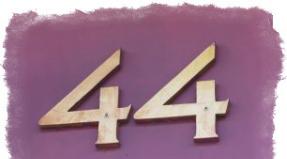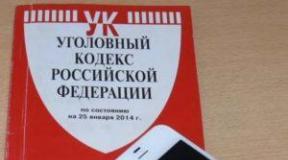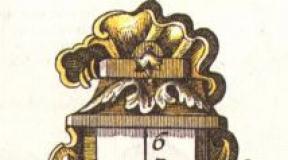The abbreviation ms stands for. What is the difference between Mrs and Miss? Conversion as a tribute to tradition
IN English language it is customary to address married women and girls differently. This culture was fixed in the 17th century, and is still preserved, despite the position of modern society on the principle of gender equality.
Appeal in English miss or mrs
The norms of etiquette, which have taken root in English-speaking countries, prescribe to distinguish in speech and in writing appeals to women of different social status. When a woman introduces herself in society, she says not only her first and last name. The rules of good manners oblige her or the person who represents her to put before the name an address that characterizes the marital status.
The status of a woman in Western society is usually denoted by a special word. In Russian culture, there are no analogues to such treatment, or they are extremely weakly expressed. Addressing women with the designation of her status was characteristic of her title of nobility, if she possessed it.
In general, this division of statuses is not typical for Russian culture, therefore the English “Miss” and “Mrs.” cannot be unambiguously compared with addresses in Russian speech.
In the English-speaking society, there are norms for the use of such addresses:
- Miss- an appeal to a girl, most often used in relation to young people under the age of 18. In addition, with the prefix Miss, you can refer to a teacher, saleswoman, maid. Also, this appeal is considered the most appropriate if the status of a woman is unknown.
- Mrs.- the traditional form of addressing a married lady. At the same time, after the appeal, you can call both the woman’s own name and the name of her husband. Divorced and widowed women use their maiden name and surname after missis.
Pronunciation
Miss in transcription looks like this:
The obsolete word Mistress, which is rarely used in oral communication, is pronounced like. More often this word has the meaning of "mistress", "mistress" or "mistress".
For example:
- Mistress of the situation - Mistress of the situation.
- Costume mistress - Main dresser.
- The dog ran alongside his mistress - The dog ran next to the mistress.
A derivative of Mistress, which eventually turned into an independent word missis, is pronounced as follows:. Missis literally means "wife".
Usage
In spoken English, miss and mistress are used in specific situations:
- Miss is an address to an unmarried person or to a school teacher, regardless of her marital status, for example:
- He was finished at Miss A.'s - She was educated at Miss A.'s boarding house.
- Which Miss Smith do you mean? – Which Miss Smith do you mean?
- mistress or missis- a form of polite address to a married or divorced lady, as well as to a widow.
Examples of verbal appeals

On the letter, full addresses are not used, they are replaced by abbreviations:
- Miss- if it is known for sure that the lady is not married;
- Mrs- if there is confidence that the woman was married or married at the moment;
- Ms- a polite form of address in letters, which indicates a person's belonging to the female sex, but does not give a direct indication of marital status.
Accepted appeals in letters
- Dear Miss Jones! - Dear Miss Jones!
- Dear Mrs. Wilson! Dear Mrs Wilson!
- Dear Ms. Smith! Dear Miss Smith!
Punctuation after abbreviation
It is customary to put punctuation marks after abbreviations in writing:
- Jane Johnson - Mrs. Jane Johnson
- John Kelly – Mrs John Kelly
After the word Miss, the dot is not put, as it is used long form words:
- Miss Dana Simms - Miss Dana Simms.
In English, there are many variants of polite forms of addressing a person.
Towards man the forms Mr., Sir, Esq. are used. , and in relation to a woman - Mrs., Ms., Miss, Madam.
Now let's look at each of them separately.
The form Mr. can be used when referring to a man, regardless of his age and marital status. The only restriction is the fact that it must be followed by the last name of the person being addressed:
Dear Mr. Ivanov, Dear Mr. Ivanov!
When addressing multiple people, use Messrs, and to the surnames themselves, the ending is plural. -s is not added and no dot is placed after the politeness form:
Messrs Thomas and Smith
If the addressee's last name is unknown, use Sir(Sirs when addressing multiple people):
Dear Sirs, Dear Sirs!
As a synonym for Mr. in England they sometimes use the form Esq. However, it is not placed before the name, but after it, and, naturally, in this case the form Mr. missing:
Michael S. Johnson, Esq.
For reference: This form goes back to the word esquire. In medieval England, an esquire was a knight's squire, and later this word came to mean one of the lowest noble titles. For some time this form was used in letters, but now it is becoming less and less common.
The form Mrs. (Mmes when referring to several women) is placed before (1) the family name or (2) before the name and surname of a married woman or (3) before the name and surname of her husband:
Mrs. Brown - Mrs. Brown
Mrs. Laura Brown - Mrs. Laura Brown
Mrs. Peter Brown - Mrs. Peter Brown
For reference:
Form is an abbreviation for mistress, which reads like . It is incorrect to assume that this is an abbreviation for missus / missis (although the readings of Mrs. and missus / missis are the same).
Why is it so?
The fact is that abbreviated forms of polite address are formed by adding the first and last letters:
Mr. = MisteR
Dr. = DoctorR
Mrs. can't be short for missus/missis because missus/missis doesn't have an r consonant, so it makes sense that
Mrs. = MistResSAt the same time, missus / missis are used in the meaning of "wife, mistress". They do not have abbreviations, since this is not a form of address that is placed before the surname. These words are typical for informal speech, for example, in a husband's speech about his wife:
I promised the missus I "d be home by eleven - I promised my wife to be home by eleven.
The form Miss used in relation to an unmarried woman and should be followed by a surname:
Dear Miss Willis, Dear Miss Willis!
The form Ms.(read or) is the language equivalent of the Mr. form, since it is used in relation to a woman, regardless of the fact of her marital status. This form was recommended by the UN in 1974 as a result of campaigns various organizations for the equality of women. It should be noted, however, that in Everyday life this form is not used as often as in official correspondence, as most women prefer to use the form Mrs. (married) or Miss (unmarried). However, modern formal and even semi-formal correspondence tends strongly to use the form Ms. This form must also be followed by the last name:
Ms. S. Smith
madam(Mesdames when referring to several women) is the most formal address to a woman. This form can be called the language equivalent of Sir, since it is also used when the addressee's last name is unknown:
Dear Madam, Dear Madam!
Dear Mesdames
In addition, this form is used in writing in relation to a high-ranking woman, married or unmarried, to the queen (queen), princess (princess), countess (countess), duke's daughter, maid of honor (maid of honor), as well as to a woman, holding an official position; with job title Madam Chairman, Madam Chairman!)
We know firsthand about the politeness of the English. High-sounding appeals such as sir (sir), my lord (my lord), lady (lady) and others, used since the Middle Ages, are designed to define and emphasize the status of a person in a conversation.
In modern England, classic appeals are still in use: the queen is called none other than Her Majesty (Her Majesty), according to the title, other members of the royal family are also addressed. For those who do not have the status of a lord or other aristocratic titles, it is customary to address according to marital status.
Today, once and for all, we will deal with such seemingly similar appeals in English as Mr, Mrs, Ms and Miss: what are these abbreviations, how are they translated and when are they used.
This knowledge will be useful to you not only in everyday communication, but also when compiling business letters, as well as filling out foreign documents.
Mr & Mrs: Who is this?
To begin with, let's deal with such basic concepts used everywhere as Mr. and Mrs. and talk about how they are written and used.
Mr ['mɪstər] - Mr.
This address is used when we are talking about a man. It doesn't matter at all whether you are married or not. Age is not important either: boys are treated this way during their studies. Used with a surname:
Mr Lewis is a very handsome man - Mr Lewis is a very handsome man
Thus, Mr is an abbreviation for the word mister, that is, "Mr" in English.
Mrs [ˈmɪsɪz] - Mrs.This is an address to a married woman in English. It can also be used in relation to a girl if she is married. The abbreviation was formed from the word mistress: the so-called "mistresses of the house" in the 18th century in Great Britain. Similar to "Mister", used together with the surname:Mrs Lane is cooking a Christmas dinner - Mrs Lane is cooking a Christmas dinner
The address Mrs (Mrs.) in English comes from the full word misses and is used both when filling out documents and in communication.
Remembering these two basic appeals is not difficult. It is enough to know that Mr is a man, and if you add s to this reduction, you get an appeal to his wife. It is also easy to remember how Mr. and Mrs. are written in English: always with a capital letter, like the surname of the person they are addressing. But whether to put a period after the abbreviation or not depends on which version of English you use. In British English, there is no period after Mr and Mrs, but in American English it is. The word must be pronounced in both cases in full.
These abbreviations are perhaps the most used around the world. A married couple is usually presented together under the same last name. For example, as in the movie Mr. & Mrs. Smith" ("Mr. and Mrs. Smith"). Also, these are the most popular words in wedding decor, when newlyweds' chairs or cakes are decorated with Mr. and Mrs., by whom they will be called after marriage.
Miss & Ms: what's the difference?
A little more complicated than with Mr and Mrs, the situation is with an appeal to a girl whose marital status is unknown to us.
Miss - miss This address is used when we are talking about a woman or girl who, as we know, is definitely not married. Miss in English is also placed before the surname of a woman or girl, but is most often used in relation to schoolgirls and students.
Please note that this word is the only one of the four addresses that is written and pronounced in its entirety, which means that the letter never has a period:
look! This is our new star Miss Lopez! - Look! This is our new star Miss Lopez!
Ms - Miss
We use this form of polite address when we do not know whether a woman is married or not. The full form of this word sounds like mizz, hence the slightly different pronunciation, more sonorous than Miss. Like all other appeals, it is used with the name of a woman or girl:
Please, give these papers to Ms Strait - Please give these papers to Ms Strait
As you can see, the difference between Miss and Ms is not that big. Especially in colloquial speech. If you doubt the marital status of the woman in front of you, you can always use the indefinite Ms.
By the way, in the business environment it is the appeal Ms that is more common, even if it is known that the woman is married.
Summing up
Often those who study English confuse the appeal to women. With men, everything is clear: he will be Mr in any case, regardless of age and marital status. But what about the ladies and the difference between Miss and Mrs in English?
The abbreviation Mrs is translated as Mrs. This is the woman who is married to Mr. It is quite easy to remember, because in this very abbreviation Mr.
If you see Ms, then this is a miss, which means an unmarried woman or girl. It is also easy to remember: if there is no letter r, then this Ms has not yet found her Mr.
This is the main difference between the abbreviations Miss and Mrs in English.
Once again about the points: they are put when writing only in American English, when we have in front of us an abbreviation for the full word mister, mistress or mizz. The word Miss (appeal to an unmarried girl) also begins with a capital letter when writing, but a period is not put after it. After the address (with or without a dot) comes the surname of a man or woman with a capital letter.
We hope that now you will forever remember in which cases such addresses in English as Mr, Mrs, Miss and Ms are used correctly.
Surely you have heard the address "Mrs" at least once. You may have come across the abbreviation "Mrs" in your letters. What is it and when is it appropriate to apply? How to communicate correctly in England and America? Let's talk about this in more detail. The information will be useful if you are going to visit Foggy Albion.
Conversion as a tribute to tradition
England is a country of traditions. The British treat their history and culture with care. This is a very conservative nation. Moreover, the rule extends to the culture of communication. In the 17th century, it was customary to separate the appeal to married and free girls. This rule is still relevant today, despite the fashion of equality of relations. The division into statuses is not typical for the Russian language. Surely you are familiar with the abbreviation "Mrs". What is it and when is it used?
Address as an expression of social status
English etiquette requires a girl or woman to emphasize her social position in dialogue or correspondence. We already know that "Mrs" is such an address to a woman. But is it always appropriate?
English has several options:

Pronunciation, transcription and obsolete meaning
Now it is clear what it is - "Mrs". The transcription of the word is as follows: .
Today "Mrs" is an address to a married woman. But earlier there was an obsolete word "Mistress". In modern English, it is practically not used anymore, it can be translated as "mistress", "mistress".

Modern meaning and usage
In modern English, the translation of "Mrs" is interpreted somewhat differently - no longer as "wife".
In writing, full appeals are not used, so the following abbreviations are accepted:
- Dear Miss Braun - Dear Miss Brown;
- Dear Mrs. Jonson - Dear Mrs. Jonson;
- Dear Ms Willison - Dear Mrs. Willison.
As you can see, the number of letters is slightly different. "Ms" is a universal way of addressing both married and single girls.
What you need to consider before starting a dialogue with the interlocutor
Before you start a conversation with anyone, you must have certain information and consider the following points:
- gender and age of the interlocutor - a more respectful treatment is expected to a person who is much older than you;
- social status;
- level of education;
- level of communication and environment. Informal and business communication differ from each other. It is unlikely that a friendly form of dialogue is suitable for business negotiations.

How to get out
If you are afraid of getting into an awkward situation, do not despair. There are several tricks that will help to arrange the interlocutors to yourself and relieve tension:
- Can I call you... - Can I call you...
- What's your name? - What is your name?
- It "s ok (well) if I" l call you ...? - Can I call you...?
Use ecxuse me to get the attention of staff or passers-by when you need help.
Contacts for a business meeting or presentation
For business communication, it’s good to know a few trump cards:
- "Sir" - this is how they refer to an adult man.
- "Madam" is an appeal to an adult, even an elderly woman.
- "Mr." along with the surname - so you can refer to any man.
- Mrs. - for a woman who is married and uses her husband's surname.
- "Ms" is the common business address for women.
A few words about punctuation
If you ever have to write a letter to an interlocutor living in England, you need to know some rules of punctuation.
In English, unlike Russian, it is not customary to put a comma after calls.
After you have used the address "Miss", do not put a full stop, as the full form follows the rules: Miss Dana Barret - Miss Dana Barret.
In Europe, another abbreviation is adopted, which has several meanings - Dr (Doctor). It does not only apply to employees. medical institutions but also to those who have a degree.
Read and learn new things. Business communication will open doors for you to a new profession and give you a lot of interesting things.
Dmitry Sokolov
"“English learning is a vast realm of discovery. As a teacher, I may know the shortcut, but it’s the students who have to make their own way to the destination. I just make sure I provide them with the right road signs”"
work experience
- I started my teaching career at the Orsha State Gymnasium No. 1, where I began to learn the basics of teaching. He combined his work at the school with teaching at the foreign language courses "Castello Studi" and tutoring in Orsha. I have always liked working with older students more because the results of my work were more obvious to me.
- After working for 2 years of distribution at school, I entered the MSLU master's program, and then taught for another 3 years at the Department of Foreign Language Teaching at MSLU. During this time, I have gained valuable experience in teaching various groups of students, including corporate, foreign and VIP groups, and got acquainted with advanced methods of teaching foreign languages.
- Having received the second higher education majoring in finance at the IBMT BSU, got a job as an analyst at the Research Institute of Economics of the Ministry of Economics, where I still work. However, teaching for me has become not just a job or a craft, but an art that I am not going to give up under any circumstances. Now, as a specialist in a narrower field, I can effectively teach business English, English in foreign trade, accounting, banking, auditing, etc.
Hobbies and interests
I prefer active leisure: tourism, practical shooting, chess, car races, cycling
Personal qualities
Active, meticulous, restless, I always strive to learn new things, a good organizer.



















